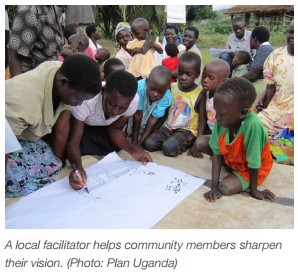A Snapshot of Evaluative Thinking: Rights for Vulnerable Populations in Uganda
This brief post consolidates the key takeaways from the recent study “Embracing Evaluative Thinking For Better Outcomes,” conducted by InterAction and the Centre for Learning on Evaluation and Results for Anglophone Africa (CLEAR-AA). The case study featured in this post focuses on Plan International's work in Uganda. Most of the text is borrowed directly from the report. To learn more about evaluative thinking and the experiences of the four NGOs highlighted, please download the full report.
About Evaluative Thinking
At any given time, how do we know how effective our strategies, operations, or programs are? In other words, how do we assess the quality and value of our work? How do we know how well we are meeting the needs of those for whom we work? How will we know if our efforts are having any unintended effects, positive or negative, and for whom?
Finding out requires more than simply collecting and analyzing monitoring data or undertaking and using evaluations, since monitoring data on its own might not tell a full story, and evaluations might not anticipate and respond to all relevant questions. We also need to explore questions of quality, value, and importance, as well as how they inform our assumptions, judgments about what is good or not, and decision making.
Evaluative thinking is ongoing, systematic inquiry and learning about quality and perceptions of what is important.
Below is a summary of a case study from a rights-based project for vulnerable populations in Uganda. It highlights why the organization decided to integrate evaluative thinking into its work, even if at the time they did not necessarily give what they were doing that name. It then describes the organization’s evaluative thinking processes and the decisions they informed; identifies factors that enabled evaluative thinking in the organizations, as well as challenges the team faced; and provides lessons learned useful beyond their organizational contexts. Much more information is provided in the full report.
Case Study Highlights
 This AusAID project, which focused on increasing access to legal and socioeconomic rights for vulnerable populations, found through a situation analysis that the most marginalized people were excluded from development initiatives and were believed to have no rights in the community, a situation that didn’t improve during project implementation. To correct the project’s course, project implementers Plan International piloted a community strengthening and inclusion (CSI) planning approach in Adyel Owango village.
This AusAID project, which focused on increasing access to legal and socioeconomic rights for vulnerable populations, found through a situation analysis that the most marginalized people were excluded from development initiatives and were believed to have no rights in the community, a situation that didn’t improve during project implementation. To correct the project’s course, project implementers Plan International piloted a community strengthening and inclusion (CSI) planning approach in Adyel Owango village.
Process: CSI planning offers ways of assessing and learning from changes that are more inclusive and responsive to the needs and aspirations of those most directly affected. CSI planning, therefore, embraces the following participatory M&E principles: stakeholders are engaged throughout the process; local capacity is analyzed and strengthened; joint learning is a focus at multiple levels.
Enabling factors: The CSI action plan generated is recognized as a people’s plan and not a project plan, fostering ownership and accountability for success. Within the project, Plan Uganda’s Monitoring, Evaluation, and Research (MER) framework demands management responses to the studies conducted by the organization, has a fully-fledged MER department, and also has strong management buy-in. AusAID also approved substantial funding for MER functions.
Challenge: Like any other participatory methodology, its calls for patience and a substantial time investment, given broad participation in decision making processes. It was also critical that the project team managed the community members' expectations.
Lessons learned: Marginalized people are knowledgeable about their situation and can offer solutions when engaged in a meaningful manner. When marginalized people are empowered, they can shape their own destiny and are optimistic about future possibilities.
Read more case studies in evaluative thinking:



